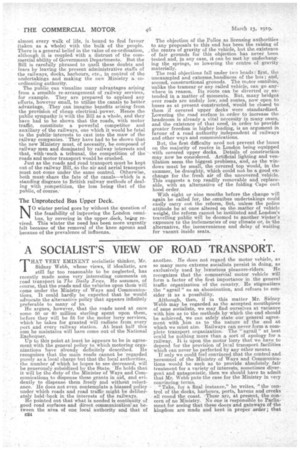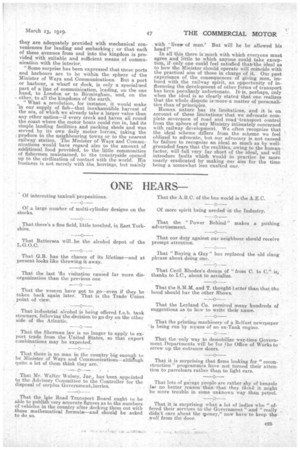I
Page 2

Page 3

If you've noticed an error in this article please click here to report it so we can fix it.
A SOCIALIST'S VIEW OF ROAD TRANSPORT.
THAT VERY EMINENT socialistic thinker, Mr. Sidney Webb, whose views, if idealistic, are still far too reasonable to be neglected, has recently made some very interesting comments on road transport in The Daily News. He assumes, of course, that the roads and the vehicles upon them will come under the Ministry of Ways and Communications, It could hardly be expected that he would advocate the alternative policy that appears infinitely preferable to many of us.
He argues, however, that the roads need at once some 50 or 60 million sterling spent upon them, before they will be fit for the motor lorry services, which he takes for granted will radiate from every port and every railway station. •At least half this sum he maintains will have come out of the National Exchequer. , Up to this point at least he 'appears to be in agreement with the general policy to which motoring organizations have already definitely described. He recognizes that the main roads cannot be 'regarded purely as a local charge but that the local authorities, the number of which he hopes to see decreased, will be generously subsidized by the State. He holds that it will be the dutyof the Minister of Ways and Communications to dispense these grants in aid, and evidently to dispense them freely and without reluctance. He does not even contemplate a biassed policy under whioh roads and road traffic might be deliberately held.back in the interests of the railways. He pointed out that what is needed is continuity of good road surfaces and direct communication' as between the area of one local authority and that of 024 another. He does not regard the motor vehicle, as so many more extreme socialists persist in doing, as exclusively used. by luxurious pleasure-riders. He recognizes that the commercial motor vehicle will form a factor of the first importance in the general traffic organization of the country. He stigmatizes the " agrail " as an abomination, and refuses to con sider it as a possibility. • Although, then, if in this matter Mr. Sidney Webb may be regarded as the accepted mouthpiece of sane socialists, we may find ourselves at variance with him as to the methods by which the end should be achieved, we can safely state our general agreement with ,him as to the nature of the end at which we must aim. Railways can never form a complete transport organization. The " agrall " at best could be nothing more than a sort of apology for a railway. It is upon the motor lorry that we have to depend for the provision of lo.20.1 transport facilities which can never be perfected by any other means. If only we could feel convinced that the control and personnel of the Ministry of Ways and Communications would be such as to provide absolutely fair treatment for a variety of interests, sometimes divergent and antagonistic, then we should have to admit that Mr. Webb puts the case for the Ministry in very convincing terms. "Take, for a final instance," he writes, "the control of the docks, harbours, ports, havens and creeks all round the coast. These are, at present, the concern of no Ministry. No one is responsible to Parliament for seeing that these doors and gateways of the kingdom are made and kent in proper order; that they are adequately provided wit la mechanical conveniences for landing and embarking ; or that each of these avenues from and into the kingdom is provided with suitable and sufficient means of communication with the interior.
"Some surprise has been expressed that these ports and harbours are to be within the sphere of the Minister of Ways and Communications. But a port or harbour, a wharf or dock, is only a specialized part of a line of communication, leading, on the one hand, to London or to Birmingham, and, on the other, to all the kingdoms of the earth. "What a revolution, for instance, it would make in our supply of fish—that inexhaustible harvest of the sea, of which we already take a larger value than any other nation—if every creek and haven all round the coast where the motor boats could run in, had its simple landing facilities and packing ,sheds and was served by its own daily motor lorries, taking the produce to the neighbouring towns or to the nearest railway station. The Minister of Ways and Communications would have regard also to the amount of additional food provided, to the little communities of fishermen maintained, to the countryside opened up to the civilization of contact with the world. His business is not merely with the herrings, but mainly with lives, of men.' But -will he be allowed his head?"
In all this there is•much with.which everyone must agree and little to which anyone could take exception, if only one could feel satisfied thatAhe ideal as to how the Minister should operate will coincide with the practical aim of those in a of it. Our past experience of, the consequences • of giving men, imbued with the railway spirit, an opportunity of influencing the development of other forms of transport has been peculiarly unfortunate. It is, perhaps, only when the idea! is so clearly stated that one realizes that the whole dispute isnnore-a matter of personalities than of principles. Human nature has its limitations, and it is on account of these limitationsethat we advocate complete saverance of road and road ',transport control from the sphere of any Ministry intimately concerned with railway development. We often recognize that the ideal scheme differs from the scheme we feel obliged to advocate, but our advocacy is not caused by failure to recognize an ideal so much as by wellgrounded fears that the realities, owing to the human factor, will • fall very far short of the ideal, and will introduce faults which would in practice be more nearly eradicated by making our aim for the time being a somewhat less exalted one.






















